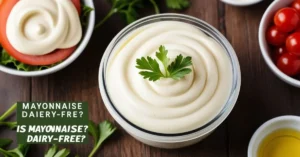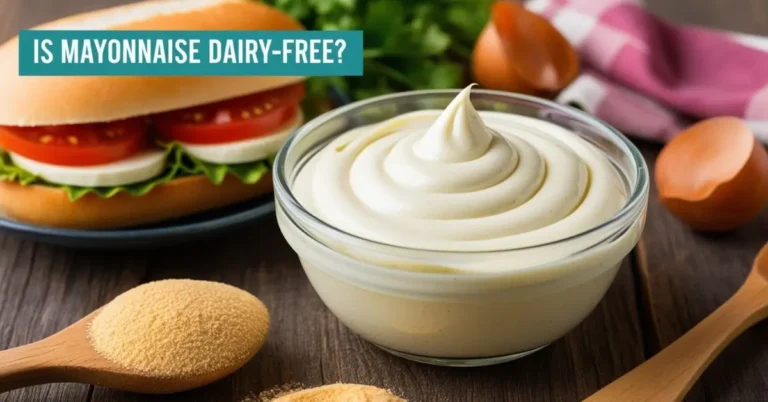Mayonnaise is one of the most popular condiments worldwide, commonly used in sandwiches, salads, and as a base for many sauces and dressings. However, with the rising interest in dietary restrictions and preferences, many people are curious about the ingredients in mayonnaise. One frequently asked question is, “Is Mayo Dairy Free?” This article will delve into the composition of mayonnaise, explore whether it is truly dairy-free, and discuss its suitability for various dietary needs.
What Is Mayonnaise?
Mayonnaise, often referred to as “mayo,” is a thick, creamy sauce made primarily from oil, egg yolk, and an acid such as vinegar or lemon juice. It is an emulsion, which means that it is a mixture of two liquids that typically do not combine well. The process of making mayonnaise involves slowly adding the oil to the egg yolk while whisking vigorously to create a stable, creamy mixture.
The basic ingredients of traditional mayonnaise are:
- Oil: Usually a neutral oil like canola, vegetable, or soybean oil.
- Egg yolk: Acts as an emulsifier, helping to bind the oil and acid together.
- Acid: Vinegar or lemon juice adds tanginess and helps with the emulsification process.
- Salt: Enhances the flavor.
The Question: Is Mayo Dairy Free?
To determine whether mayonnaise is dairy-free, we first need to define what “dairy” means. Dairy products are derived from the milk of mammals, primarily cows, but also goats, sheep, and other animals. Common dairy products include milk, cheese, butter, yogurt, and cream. The key component of dairy is lactose, a sugar found in milk, and casein, a protein found in milk.
Given this definition, the primary ingredients in mayonnaise—oil, egg yolk, and vinegar—do not come from milk or other dairy products. Therefore, traditional mayonnaise does not contain any dairy ingredients and is indeed dairy-free.
Ingredients to Watch Out For

While traditional mayonnaise is dairy-free, some variations and store-bought brands may contain ingredients that could pose a concern for those with dairy allergies or intolerances. It’s essential to read the label carefully to ensure that the mayonnaise you are purchasing is free from dairy products.
- Creamy Variants: Some mayonnaise products are marketed as “creamy” or “whipped,” which may contain dairy ingredients such as cream or milk solids. These are not dairy-free and should be avoided if you are looking to avoid dairy.
- Specialty Flavors: Flavored mayonnaises, such as those with added cheese or ranch flavoring, might contain dairy ingredients. Always check the ingredient list for potential dairy content.
- Cross-Contamination: In some manufacturing facilities, mayonnaise may be produced alongside dairy-containing products, leading to potential cross-contamination. If you have a severe dairy allergy, look for brands that specifically label their products as dairy-free or made in a dairy-free facility.
Mayonnaise and Other Dietary Restrictions
While mayonnaise is dairy-free, it’s also important to consider other dietary restrictions and preferences that may affect whether you can or should consume mayonnaise.
1. Egg Allergy or Vegan Diet
One of the primary ingredients in traditional mayonnaise is egg yolk, making it unsuitable for vegans and those with egg allergies. However, there are egg-free mayonnaise alternatives available, often referred to as “vegan mayonnaise.” These products typically use plant-based emulsifiers such as aquafaba (the liquid from cooked chickpeas) or soy protein instead of egg yolk. Vegan mayonnaise is not only dairy-free but also free from animal products, making it a suitable option for vegans and those with egg allergies.
2. Gluten-Free Diet
Mayonnaise is naturally gluten-free, as its basic ingredients do not include any gluten-containing grains like wheat, barley, or rye. However, some store-bought brands may add flavorings, stabilizers, or preservatives that could contain gluten. If you have celiac disease or gluten sensitivity, it’s essential to check the label to ensure the mayonnaise is certified gluten-free.
3. Keto and Low-Carb Diet
Mayonnaise is a popular choice for those following a ketogenic (keto) or low-carb diet due to its high fat content and low carbohydrate count. Traditional mayonnaise made with healthy oils like avocado oil can be an excellent addition to a keto diet. However, be cautious of low-fat or “light” mayonnaise options, which may contain added sugars or other ingredients that increase the carbohydrate content.
4. Soy-Free Diet
Many commercial mayonnaise brands use soybean oil as the base, which could be an issue for those with soy allergies or sensitivities. Fortunately, there are soy-free mayonnaise options available, often made with alternative oils such as olive oil, avocado oil, or coconut oil. These soy-free mayonnaise options are also dairy-free, making them suitable for those avoiding both soy and dairy.
Homemade Mayonnaise: A Dairy-Free Option
Making mayonnaise at home is a simple and rewarding process that allows you to control the ingredients, ensuring that your mayonnaise is truly dairy-free. Here’s a basic recipe for homemade mayonnaise:
Ingredients:
- 1 large egg yolk
- 1 teaspoon mustard (optional, for flavor)
- 1 tablespoon lemon juice or vinegar
- 1/2 teaspoon salt
- 1 cup neutral oil (such as canola, avocado, or light olive oil)
Instructions:
- In a medium-sized bowl, whisk together the egg yolk, mustard, lemon juice, and salt until well combined.
- Slowly begin adding the oil, just a few drops at a time, while whisking continuously. This slow addition is crucial to forming a stable emulsion.
- As the mixture begins to thicken, you can start adding the oil in a slow, steady stream while continuing to whisk. If the mayonnaise becomes too thick, you can thin it out with a few drops of water or more lemon juice.
- Continue whisking until all the oil is incorporated and the mayonnaise is thick and creamy. Taste and adjust the seasoning with more salt or lemon juice if needed.
This homemade mayonnaise is not only dairy-free but also free from any preservatives or additives that might be present in store-bought versions. You can also experiment with different flavors by adding herbs, garlic, or spices to the basic recipe.
Popular Dairy-Free Mayonnaise Brands
For those who prefer the convenience of store-bought mayonnaise, several brands offer dairy-free options. Here are a few popular dairy-free mayonnaise brands:
- Hellmann’s Vegan Mayonnaise: Known for its creamy texture and rich flavor, Hellmann’s Vegan Mayonnaise is a dairy-free and egg-free alternative that closely mimics traditional mayonnaise.
- Vegenaise: A popular choice among vegans, Vegenaise is made with non-GMO ingredients and comes in various flavors, including original, soy-free, and avocado oil-based versions.
- Sir Kensington’s Fabanaise: This mayonnaise is made with aquafaba, the liquid from cooked chickpeas, making it both dairy-free and egg-free. It has a slightly tangy flavor and is available in classic and flavored varieties.
- Just Mayo: Made without eggs or dairy, Just Mayo is a plant-based mayonnaise that offers a similar taste and texture to traditional mayonnaise. It is available in various flavors, including garlic, chipotle, and sriracha.
- Chosen Foods Avocado Oil Mayo: Made with avocado oil, this mayonnaise is dairy-free, soy-free, and gluten-free. It has a light, clean flavor and is a great option for those following a paleo or keto diet.
Mayonnaise Alternatives
For those who cannot or choose not to consume traditional mayonnaise, there are several alternatives that can be used in place of mayonnaise in recipes.
- Greek Yogurt: While not dairy-free, Greek yogurt can be a healthier alternative to mayonnaise for those who can tolerate dairy. It has a similar creamy texture and tangy flavor and can be used in salads, sandwiches, and dips.
- Hummus: Hummus, made from chickpeas, tahini, lemon juice, and garlic, is a dairy-free and vegan alternative to mayonnaise. It adds a savory, nutty flavor to dishes and can be used as a spread or dip.
- Mashed Avocado: Avocado is another dairy-free alternative to mayonnaise. Its creamy texture and mild flavor make it a great substitute in sandwiches and wraps.
- Tahini: Tahini, a paste made from ground sesame seeds, can be used as a mayonnaise substitute in dressings and dips. It has a rich, nutty flavor and is dairy-free and vegan.
- Cashew Cream: Made from soaked and blended cashews, cashew cream is a dairy-free and vegan alternative to mayonnaise. It has a smooth, creamy texture and can be flavored with lemon juice, garlic, or herbs.
Conclusion
Traditional mayonnaise is dairy-free, as it is made from oil, egg yolk, and an acid such as vinegar or lemon juice. However, it’s essential to be aware of the potential for dairy-containing additives in certain store-bought brands or specialty flavors. For those with dietary restrictions or preferences, there are plenty of options available, including vegan mayonnaise, homemade mayonnaise, and various mayonnaise alternatives.
Whether you’re avoiding dairy due to an allergy, lactose intolerance, or personal preference, you can enjoy the creamy texture and rich flavor of mayonnaise without worry. By understanding the ingredients and carefully selecting your mayonnaise or alternative, you can continue to enjoy this versatile condiment in your meals.

